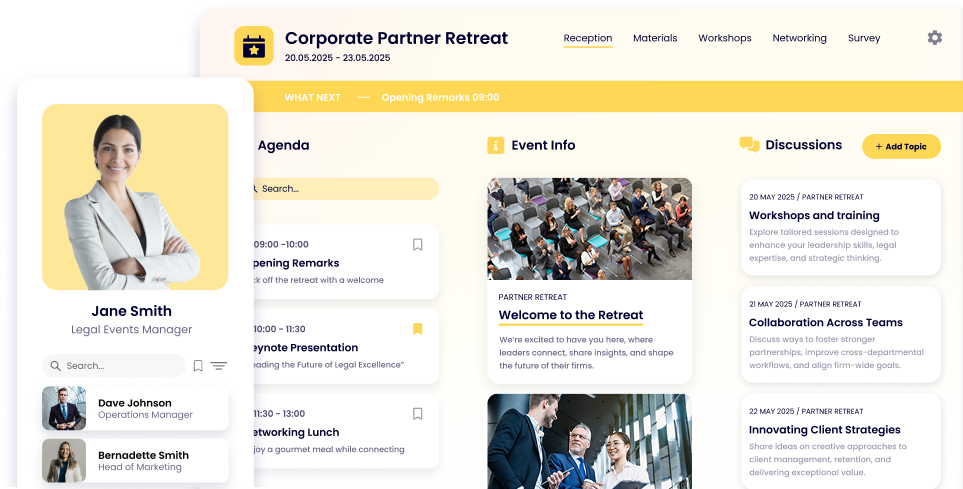Event Technology: What to know in 2025?

Lisa Broom | Head of Marketing

How can you transform your events into more streamlined, engaging, and successful experiences? Event technology is the answer. From tools that simplify planning to apps that enhance attendee interaction, the right technology makes all the difference. In this article, discover the top event technology trends for 2025 and learn how they can revolutionize your event planning.
Key Takeaways
- Embrace event technology to streamline planning and enhance attendee experiences, driving satisfaction and engagement.
- Stay ahead of trends like AI personalization, VR/AR integration, and sustainability to create memorable, impactful events.
- Choose event tech solutions that align with your workflows, fostering collaboration and ensuring a smooth event experience.
What is Event Technology

Event technology encompasses the tools, apps, and software employed to plan, execute, and measure events. These innovations have transformed the events industry by streamlining the planning process through data-driven solutions. Event professionals increasingly depend on virtual, hybrid, and digital in-person events to address diverse audience needs, resulting in hassle-free and safer experiences for everyone involved. An effective event strategy is essential for maximizing these benefits.
Event technology’s impact on the industry is significant, supporting collaboration by streamlining information flow and organizing tasks among stakeholders. This consolidation saves time and money while boosting the chances of achieving event goals. A staggering 90% of event professionals believe that technology positively affects event success, underscoring its importance in modern event planning.
Event technology also enhances planning by providing practical tools and reducing guesswork for organizers. These innovations aim to improve the attendee experience, reflecting positively on the brand and organization. From event management software to mobile event apps, the right event technology solutions can elevate the entire attendee journey.
Leveraging Event Technology for Enhanced Experiences
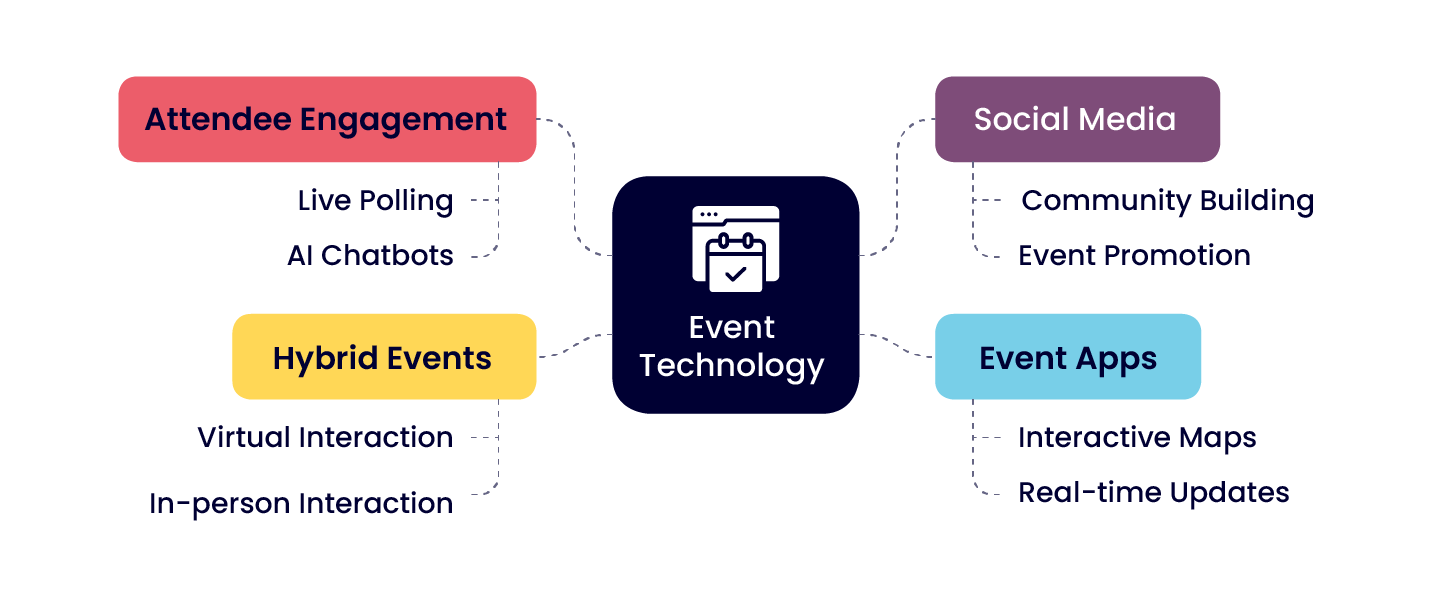
Event planners today have a powerful arsenal of tools at their disposal to create customized event experiences that resonate with their audience. Utilizing attendee preferences allows planners to boost satisfaction and engagement. Social media platforms play a critical role in engaging attendees and fostering event-specific communities. Through live polling, AI chatbots, or virtual and augmented reality, the objective is to craft unforgettable experiences that keep attendees engaged.
In-person events benefit from technology like event apps, which provide personalized schedules, interactive maps, and timely updates. These mobile event apps facilitate seamless navigation and real-time communication, making the entire event experience more interactive and engaging. Hybrid events leverage both virtual and in person event interactions, ensuring an immersive experience for all attendees.
Modern technology investment transforms virtual events into engaging experiences. Platforms with live streaming and participation options significantly boost attendee engagement. AI chatbots offer immediate assistance, enhancing the overall attendee experience. Incorporating event technology continues to expand the number of virtual events and virtual event attendees globally.
How To Choose the Right Event Tech
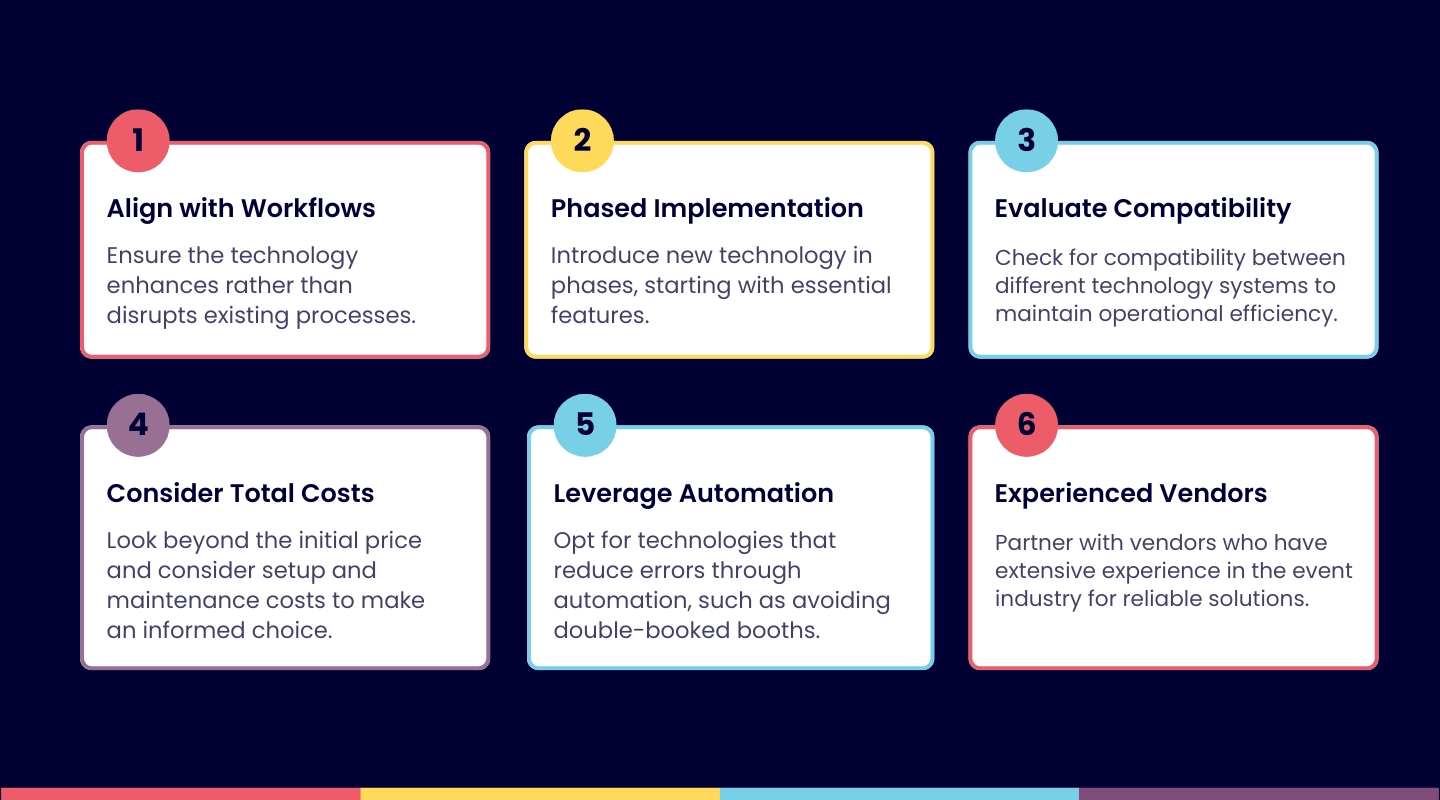
Selecting the appropriate event technology can be daunting, but a structured approach can simplify it:
- Align with Current Workflows: Ensure the technology enhances rather than disrupts existing processes.
- Phased Implementation: Introduce new technology in phases, starting with essential features.
- Evaluate Compatibility: Check for compatibility between different technology systems to maintain operational efficiency.
- Consider Total Costs: Look beyond the initial price and consider setup and maintenance costs to make an informed choice.
- Leverage Automation: Opt for technologies that reduce errors through automation, such as avoiding double-booked booths.
- Experienced Vendors: Partner with vendors who have extensive experience in the event industry for reliable solutions.
Considering these factors helps event planners choose the right technology that aligns with their goals and enhances the overall event experience.
Key Trends Shaping Event Technology in 2025
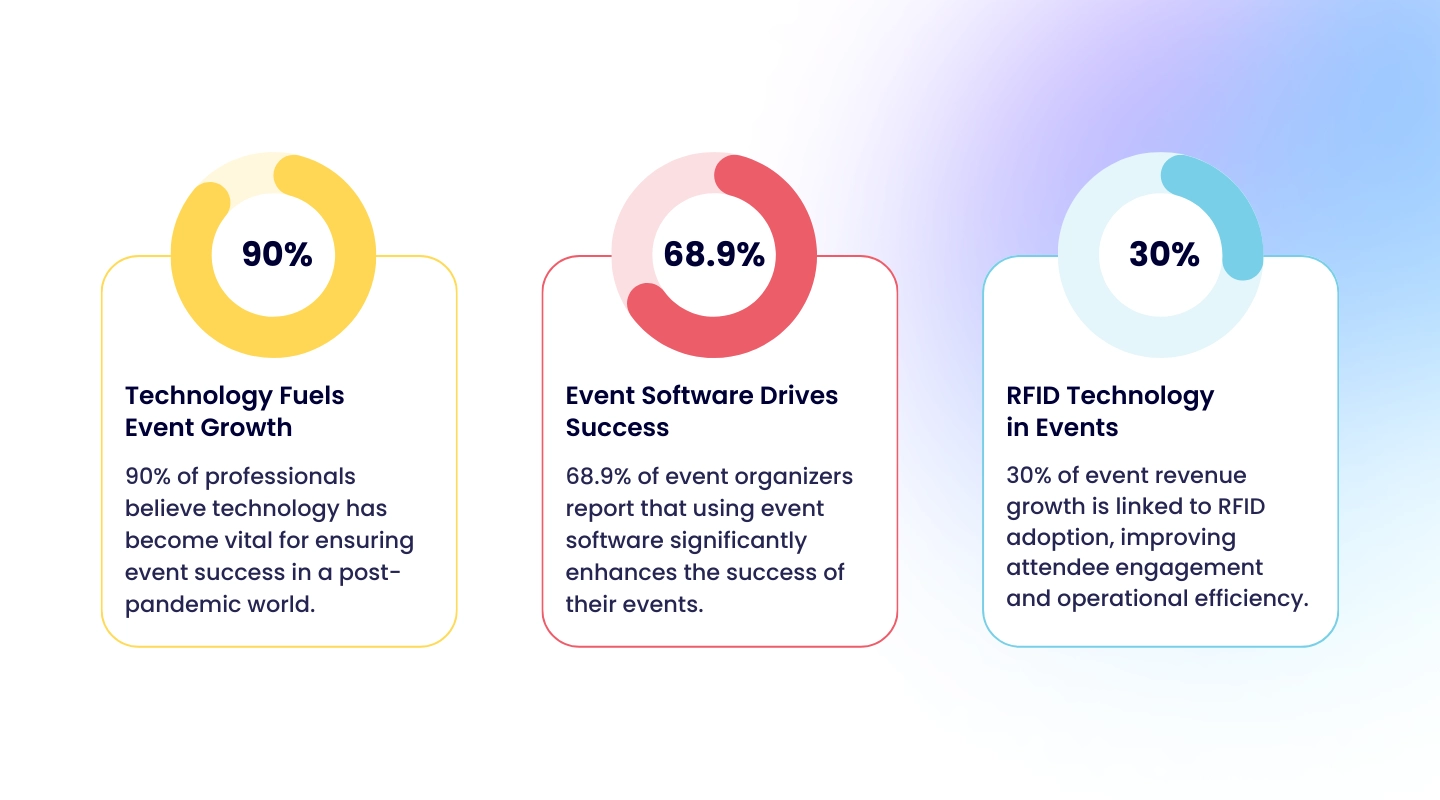
The events industry is undergoing a significant transformation due to key trends in 2025. Notably, 68.9% of event organizers report that event software positively impacts their events’ success, and post-pandemic, 90% of professionals believe technology enhances event success. These trends streamline various aspects of event planning, making processes faster and more efficient.
Among the most notable trends are the integration of digital twins, AI, virtual reality, and a strong focus on sustainability. Digital twins allow event planners to create virtual simulations of event setups, reducing the need for physical prototypes and minimizing waste. This technology also enables real-time performance monitoring, helping to optimize resource usage and lower energy consumption.
AI, virtual reality, and sustainability are set to significantly reshape the industry, with many planners prioritizing eco-friendly practices and venues.
AI-Powered Personalization
Artificial Intelligence (AI) is transforming event planning by providing personalized experiences and recommendations based on attendee preferences and behavior. AI-powered solutions generate insights into the entire attendee journey, helping create more tailored experiences. Tracking attendee preferences and behaviors allows planners to tailor experiences to individual needs, ensuring a more engaging event.
Additionally, AI improves communication and engagement by streamlining event-related content creation. AI chatbots provide 24/7 assistance to attendees, ensuring their needs are met throughout the event. Utilizing AI in event planning streamlines key touchpoints, improves security, and enhances the overall attendee experience.
Virtual and Augmented Reality
Virtual reality (VR) and augmented reality (AR) are revolutionizing events by offering immersive and interactive environments for attendees globally. These technologies allow attendees to explore virtual venue tours, participate in interactive sessions, and engage with content in a more dynamic way. Recent advancements have made VR and AR more affordable, increasing their accessibility for a broader range of events.
The integration of VR and AR into event planning offers numerous benefits. For example, VR can create virtual simulations of event setups, while AR can enrich in-person experiences by overlaying digital information onto the physical world. These technologies not only boost attendee engagement but also create memorable experiences that resonate long after the event concludes.
Contactless Solutions
Facial recognition technology is revolutionizing event check-ins by expediting registration processes and significantly enhancing security. This technology enhances the attendee experience by allowing for faster entry and exit at the venue. However, it is crucial to obtain attendee consent to address privacy challenges associated with facial recognition.
RFID technology is another contactless solution gaining traction. RFID wristbands and badges gather attendee admission data, detect security access, and streamline entry processes. These technologies provide cost-effective data collection and validate event success.
Overall, contactless check-ins enhance safety and streamline logistics, reducing queues and physical contact.
Top Event Technologies
The event technology landscape is rapidly evolving, with a focus on enhancing attendee experiences through innovative solutions. From mobile event apps to advanced networking tools and streamlined registration software, these technologies are transforming how events are planned and executed.
The following sections explore some of the top event technology trends for the next event making waves in 2025.
Mobile Event Apps: A Must-Have Tool
Mobile event apps are now essential tools for modern event planners, enhancing attendee engagement with features like instant messaging, personalized schedules, and interactive maps. The rise in smartphone usage has made mobile event apps crucial for ensuring seamless communication and navigation during events. Attendees can create personalized schedules within these apps, enriching their overall experience.
Moreover, mobile event apps provide real-time updates, keeping attendees informed about any changes or announcements during events. These apps also offer sponsors and exhibitors real-time branding opportunities and interactive features to engage attendees. Event apps streamline communication and reduce waste by eliminating the need for on-site support staff for announcements.
Enhancing Networking Opportunities with Event Tech
Event technology has greatly enhanced networking opportunities, enabling better user experiences and instant connections among attendees. Features such as matchmaking systems and virtual networking events enhance connections among attendees, speakers, and sponsors. These advancements foster connections, community, and meaningful conversations, leading to improved networking outcomes.
Integration of social media within event platforms fosters collaboration and valuable networking exchanges. Advanced analytics in event tech allows organizers to track engagement patterns, leading to more effective networking opportunities.
In 2025, measuring the strength of relationships, known as Return on Relationships (ROR), will be crucial for event success.
Event Registration Software: Simplifying Sign-Ups
Event registration software simplifies the sign-up process for events. Cloud-based event management software aids in automating time-consuming tasks, allowing organizers to focus on essential aspects of event planning. This software also centralizes attendee data, making tracking and managing information more efficient. Automating tasks with this software saves time throughout the event planning process and enhances the effectiveness of event management tools, including event websites and an event website.
Modern registration software often integrates seamlessly with payment gateways, streamlining the financial aspect of event management. These tools ensure compliance with data protection regulations, enhancing attendee information security. Many event registration tools now feature mobile-friendly interfaces, making it easier for attendees to sign up and access information on the go.
Sustainability Through Event Technology
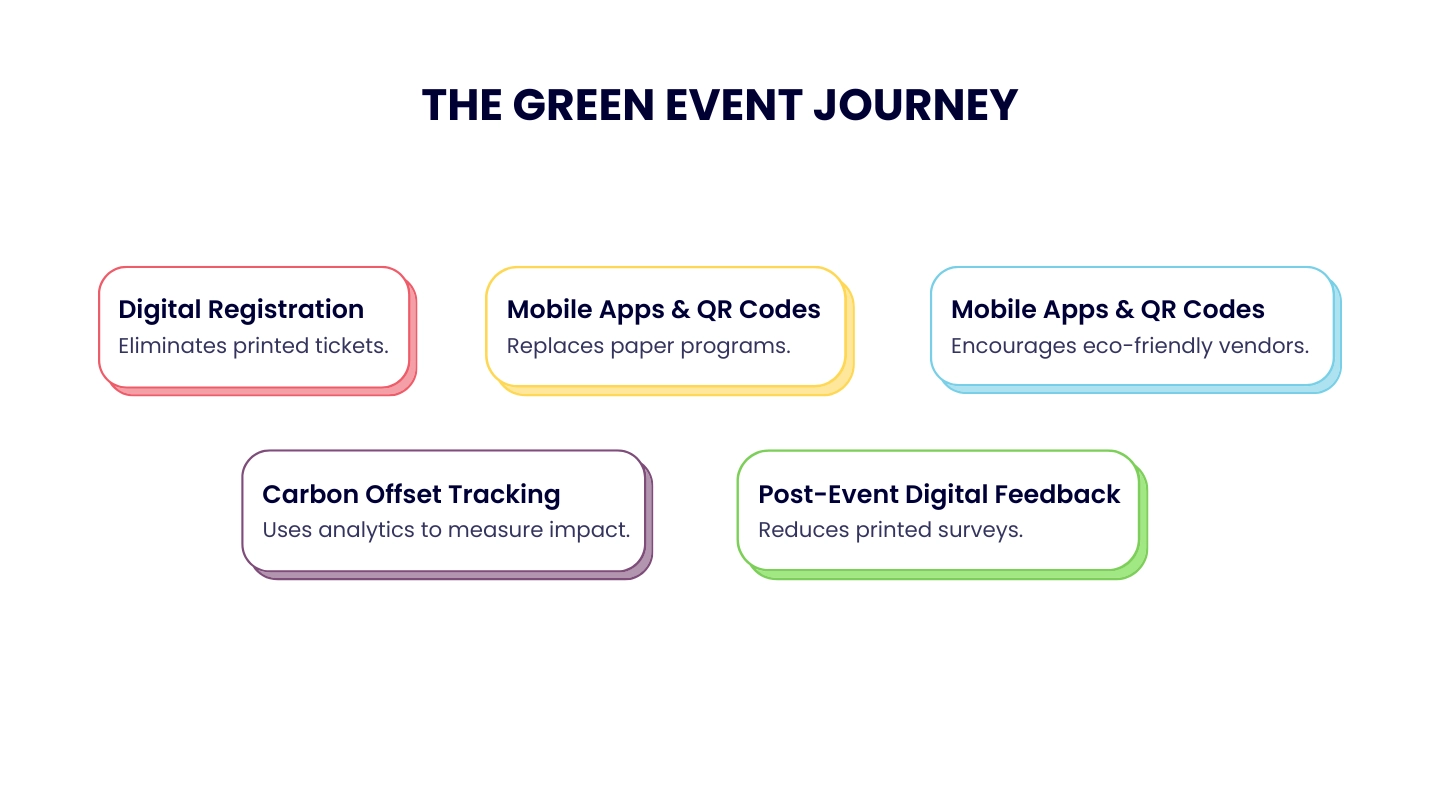
Sustainability is becoming a cornerstone in event planning, with technology solutions playing a crucial role in driving this change. Mobile event apps offer digital information access, significantly reducing paper usage during events. Digital registration further reduces environmental impact by minimizing the need for printed materials. These eco-friendly practices reduce waste and align with global initiatives to lower environmental footprints.
Key sustainable practices in event planning include minimizing carbon footprints, using sustainable materials, local sourcing, recycling, and composting. The future of event planning hinges on integrating innovative event technology solutions that prioritize sustainability. Adopting these technologies enables event planners to host successful events while promoting environmental responsibility.
Event Marketing Technology for Business Growth
Event marketing technology is vital for driving business growth and audience engagement. Email marketing tools like MailChimp, HubSpot, and Constant Contact facilitate personalized event messaging and targeted promotions. These tools enable event planners to capture insights throughout the attendee journey and optimize event strategies for better outcomes. Social media enhances event marketing by promoting events through attendee-generated content and fostering interaction across platforms.
Data analytics is crucial in event marketing technology, enabling marketers to make informed decisions based on attendee behavior and preferences. Using these digital tools, event planners can create more effective marketing campaigns, resulting in increased attendance and business growth. Integrating social media platforms, email marketing tools, and data analytics ensures a comprehensive approach to event marketing.
Partnering with Event Technology Vendors

Choosing the right event technology vendors is crucial for hosting successful events. When selecting vendors, consider functionalities and innovative features that meet your event’s specific needs. Prioritizing customer support and success tools can improve your decision-making process. Effective communication with vendors during planning can prevent miscommunication and minimize errors.
Researching key factors and choosing vendors with extensive event industry experience ensures reliable support and innovative solutions. Prioritize best-in-class support and quick issue resolution when selecting technology providers.
Using a single event platform can boost collaboration, reduce miscommunication, and enhance overall planning efficiency. Seamless integration with existing systems and payment processors ensures secure online transactions and smooth operations.
Summary
In summary, the event technology landscape in 2025 is marked by innovations that enhance attendee experiences, streamline planning processes, and promote sustainability. From AI-powered personalization and virtual reality to contactless solutions and mobile event apps, these technologies are transforming how events are planned and executed. By staying abreast of the latest trends and effectively leveraging event technology, event planners can create unforgettable experiences that drive business growth and leave lasting impressions. Embrace the future of event technology and take your events to new heights.
FAQs
What is an event technology specialist?
An event technology specialist is crucial for ensuring the success of various events by handling technical, organizational, and design aspects. Embrace this role to create seamless and unforgettable experiences!
What technology is needed for an event?
To run a successful event, you need essential technology like ticketing and registration systems, access management tools, and event reporting software. Embrace these tools to streamline your planning and enhance the experience for your attendees!
What is an event technology?
Event technology is essential for effectively planning and executing events, whether in-person, virtual, or hybrid. Embrace these tools to enhance your event experience and achieve measurable success!
How can I choose the right event technology for my event?
Choosing the right event technology is crucial; align it with your workflows and evaluate compatibility to ensure smooth integration. By leveraging automation and partnering with experienced vendors, you can enhance your event’s success without overspending.
What are the key trends in event technology for 2025?
In 2025, expect to see exciting advancements in event technology like AI-powered personalization, immersive virtual and augmented reality, contactless solutions, and a strong focus on sustainability. Embrace these trends to elevate your events to the next level!





